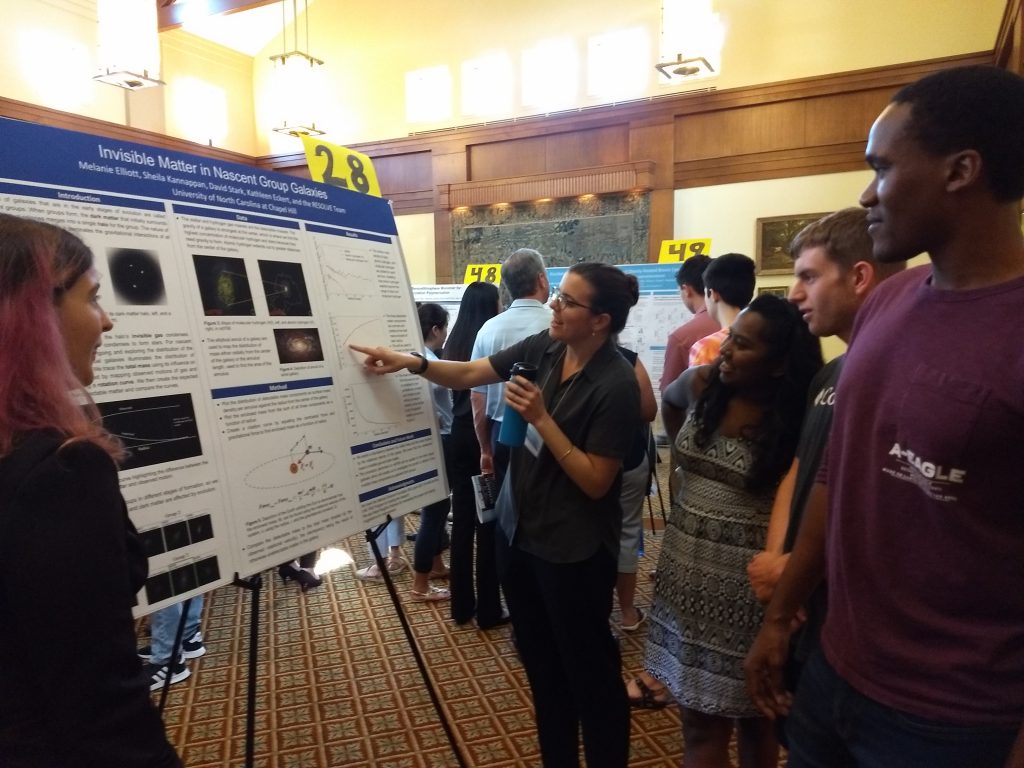Undergraduate Program
Programs Courses, credits and placement Undergraduate research and honors UNC Best Scholarships and grants Learning resources
CAP Boot camp Physics foundations seminar Society of Physics Students Visibility in Physics TA Information
What Is Physics?
Physics is the study of matter, energy, and their interactions with one another. Physics seeks to study the world around us, the world inside us, and the world beyond us. It is the foundation of all other natural sciences, including chemistry, biology, oceanography, geography, and radiography. From the formation of the universe to the way that nanoparticles influence the natural world, physics seeks to answer the fundamental questions in nature.
Careers in Physics
“When I precisely know the roles & responsibilities of the position, I hire an engineer. When a technical mind is needed but there is ambiguity around exact responsibilities, I hire a physicist.”
– Sandeep Giri, Senior Staff and Technical Project Manager at Google
With a bachelor degree in Physics students can pursue careers in research and development, engineering, medicine, law, business, and the military.
35% of graduates enroll in a physics or astronomy graduate program, 20% enroll in other STEM graduate programs like engineering or go to medical school or law school.
Over 40% of students join the workforce after graduating with a bachelor’s degree in Physics. Common job titles for physics and engineering physics bachelor’s degree recipients include:
|
|
See also our Career Info page.
“Do Physics. Be Anything.”
| Adam Falk | Kevin Macon | Megan Carlson |
| Antonio Cortes | Heidi Schweiker | Nicole Estrich |
| Chris Nickell | Lauren Bain | Randy Martin |
| David Harris | Mark Schubel | Ted Steger |
Curriculum and Degrees
For a quick introduction on our undergraduate program, click here.
We offer two B.S. degrees (Physics BS and Astro BS) and six B.A. degrees (Physics, Astronomy, Quantitative Finance, Medical and Biological Physics, Computational Physics, and Energy) in Physics. The B.S. degrees are more mathematically intensive, and are generally regarded as better suited for students that plan on applying to a Physics and Astronomy PhD program after graduation. The six B.A. tracks offer more flexibility and prepare students well for a successful career in research and development, engineering, finance, education, medicine, and law.
In addition to our degree programs, we also offer both a physics and an astronomy minor.
The UNC Course Catalog offers details on all paths of study related to the department.
Contact Information
General questions about our program can be directed to either Jacob Hurst (hurstj@unc.edu ), our Academic Affairs Coordinator, or Tamara Branca (rtbranca@physics.unc.edu), our Director of Undergraduate Studies.
If you are already a UNC student and are thinking about majoring in Physics, you may contact our Department advisors for questions:
Physics Advisors Fall 2023 – Spring 2024
For Students with last names or majors:
A – M
- Dr. Lu-Chang Qin, Chapman Hall 329
- lcqin@email.unc.edu
A-L Astrophysics, BA Astronomy, and Astronomy minors
- Dr. Andrew Mann, Phillips 242
- awmann@unc.edu
S – Z
- Dr. Jennifer Weinberg-Wolf, Phillips 182
- jweinber@physics.unc.edu
N–R or M-Z Astrophysics, BA Astronomy, and Astronomy minors
- Dr. Dan Reichart, Morehead Planetarium and Science Center 404
- reichart@physics.unc.edu
Quantitative Finance majors
- Dr. Stefan Jeglinski, Phillips 174
- jeglin@physics.unc.edu
at Chapel Hill
There are currently around 18,500 undergraduates at the University of North Carolina at Chapel Hill. Of those, about 200 are physics majors. These students enjoy the benefits of:
- Small class sizes (around 25 students per course)
- Highly individualized attention and advising from faculty
- Early exposure to cutting-edge research (UNC is ranked 8th in research activities among all U.S. public and private universities)
- An exceptional social network within the Society of Physics Students (SPS) and Visibility in Physics (ViP)














